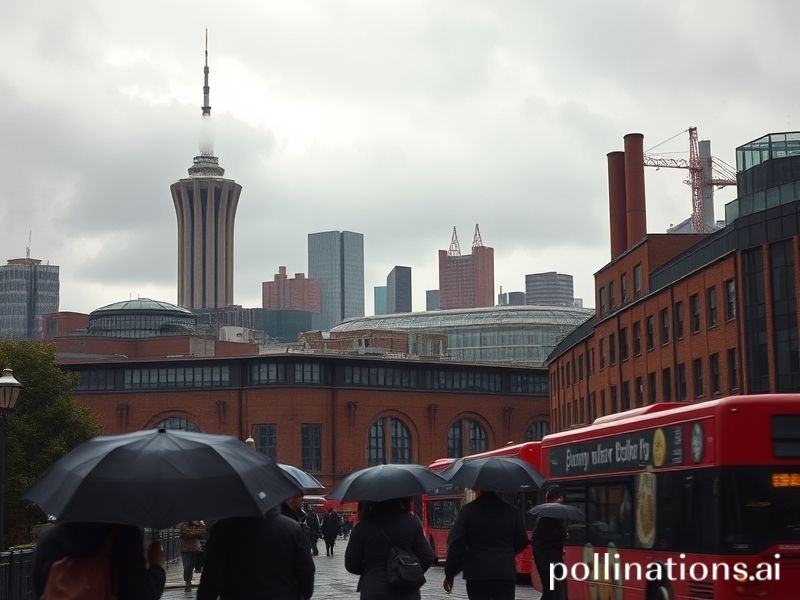Why Manchester’s Drizzle Is Quietly Running the World (and Ruining Everyone’s Day)
Manchester, England, has always prided itself on exporting gloom at scale—first via the Smiths’ back catalogue, now via low-pressure systems that circle the globe like grumpy tourists. The city’s latest forecast—steady drizzle, intermittent existential dread, maximum 12 °C—may read like a local shrug, but in a world where the jet stream is drunk-dialling the Arctic, it matters from Lagos to Lima. When Manchester leaks, the planet tends to get damp receipts.
Meteorologists, a profession whose only reliable product is the phrase “changeable,” now point to the North Atlantic Oscillation (NAO) as the culprit. A negative NAO phase funnels Atlantic storms toward north-west Europe the way Silicon Valley funnels venture capital toward apps that deliver toast. The current dip in the NAO has already delayed monsoons in India, forced Spanish olive growers to buy umbrellas, and given New Yorkers an unseasonably polite spring. Somewhere in the Met Office, a technician is updating the model and quietly wondering if the supercomputer has developed seasonal depression.
Globally, Manchester’s soggy Tuesday is a Rorschach test for climate anxiety. In California, almond farmers scroll the forecast and mutter about supply chains; in Bangladesh, coastal engineers see it as another data point for sea-wall invoices; in Switzerland, reinsurance actuaries tighten their neckties and fantasise about early retirement. The city that once exported textile mills and industrial lung disease is now exporting atmospheric feedback loops—an upgrade, of sorts.
The geopolitical subplot is equally moist. The UK’s post-Brexit trade deals are weather-sensitive: a soggy summer in Manchester depresses domestic tourism, pushing Brits toward Mediterranean beaches and worsening Spain’s drought. Meanwhile, Gulf petrostates—whose own thermostats are stuck on “blast furnace”—quietly subsidise British cloud-seeding start-ups, proving once again that irony is the only renewable resource. The Foreign Office, ever eager to weaponise drizzle, has floated a “Grey Sky Diplomacy” initiative: sell Manchester’s surplus precipitation to water-stressed allies in exchange for, well, anything that isn’t rain.
Financial markets, those finely tuned hysteria engines, have already responded. Futures contracts on European natural gas tick upward every time a Mancunian forgets an umbrella, because traders know a cold snap follows the damp like remorse follows karaoke. Over in Zug, cryptocurrency miners—whose rigs are cooled by Alpine meltwater—cheer each Manchester downpour; the longer Europe stays grey, the less likely regulators are to notice their carbon sins. It’s a bull market in nihilism, and Manchester is the bellwether.
Back on Deansgate, commuters queue for buses that arrive soaked and apologetic, proving public transport remains the only sector that blushes. Locals, raised on a diet of pessimism and chips, insist the rain is character-building—though character, like the Arndale Centre roof, has been known to leak. One pensioner, interviewed under a bus shelter that doubles as a wind tunnel, remarked that at least the rain “keeps the Americans away,” apparently unaware that three Silicon Valley executives in Gore-Tex are currently photographing puddles for a new mindfulness app called DrizzlePath™.
And yet, there is grandeur in this cosmic pettiness. Every Manchester drizzle droplet began life as a Pacific typhoon, a Saharan dust mote, or a Canadian wildfire ash particle—a reminder that even the most provincial weather is a globetrotter with a forged passport. The city’s dampness is, in the end, a unifying force: whether you’re a Syrian refugee in Berlin, a soybean trader in São Paulo, or a Manchester United fan in Jakarta, you’re getting rained on by the same recycled molecules. The Anthropocene: come for the existential dread, stay for the shared umbrella shortage.
So when the forecast says “light rain, becoming heavier by evening,” understand it as a diplomatic cable from the troposphere. Manchester’s weather is no longer merely local colour—it’s a synoptic shrug that ripples through wheat futures, migration patterns, and the collective mood of a planet that forgot how to fix its own thermostat. Pack a mac. Or don’t. Either way, the clouds aren’t asking permission.







